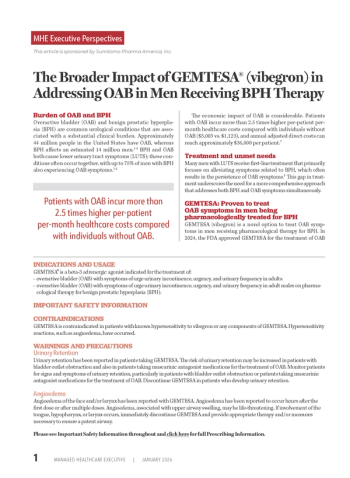
Transforming Post-Acute Care into an Integrated, Member-Centric Process
Sponsored Content
The Challenges of Today’s System
Post-acute care is essential to patient recovery following a hospitalization. Unfortunately, it’s not always a quick process to get to the right setting along with the appropriate equipment for patients to recover. A fragmented system often leads to delays in transferring patients to a post-acute care facility or to their home, and can cause delays in receiving timely services. These barriers leave some patients waiting in hospitals or other care settings longer than may be necessary, driving up costs for payers and frustrating both patients and their clinicians.
Historically, oversight of post-acute services has been framed as a “gatekeeper” function, too often associated with denials and delays. The real opportunity lies in transforming this function into a supportive, member-centric process that ensures patients receive the right care, in the right place, for the right length of time.
A Clinically Grounded Approach
Changing the post-acute paradigm includes leveraging clinical expertise for determining optimal care. Specialists with expert knowledge of clinical care needs and those who have worked in post-acute settings are best equipped to make those evaluations. OneHome recruits physicians with deep expertise across specialties, including board-certified geriatricians, surgeons, palliative and hospice care providers, and rehabilitation specialists. These highly trained professionals know what care looks like inside skilled nursing facilities, inpatient rehabilitation centers, and in the home setting. Their expertise allows for more consistent and clinically informed decisions—designed to reduce the need for appeals and ensure patients’ care plans are grounded in real-world experience and understanding.
Reducing Administrative Burden and Delays through Smart Design
To eliminate unnecessary delays, OneHome has built automation into the process. Clear-cut cases of medical necessity are routinely processed with minimal manual intervention, freeing clinical specialists to focus on complex cases that require careful consideration. This can reduce unnecessary waits for patients and help providers spend less time navigating paperwork. Importantly, OneHome emphasizes collaboration with ordering physicians rather than binary “yes or no” decisions. Deep, clinical conversations, in many instances, are used to explore alternative settings or services that may better fit a patient’s recovery goals.
Coordinated Support for Complex Cases
For patients with particularly complicated needs, OneHome employs discharge planners who function much like in-hospital case managers or social workers. These planners work hand-in-hand with OneHome’s preferred provider network to find the most appropriate placement and services. For example, a patient no longer needing skilled nursing care but reliant on a ventilator can be quickly transitioned to a home health provider equipped to handle their needs. This coordination helps prevent gaps in care and promotes smoother, timelier transitions.
Advancing Value-Based Care
One of the most significant transformations comes from moving away from traditional models—which often lead to frequent requests for additional services—toward episodic, value-based arrangements. In this structure, providers receive a bundled payment, giving them flexibility to deliver the services they deem most appropriate. Providers appreciate the autonomy and the focus on patient outcomes, patients receive more personalized care, and payers benefit from clearer alignment between outcomes and costs. This model also helps identify high-performing providers who can be prioritized within OneHome’s network.
Accountability and Results
By integrating clinical expertise, automation with oversight, and value-based incentives, OneHome regularly achieves faster turnaround times for service determinations than those required by the Centers for Medicaid and Medicare Services. Equally important, it helps reduce administrative tasks for providers and enables patients to recover in the settings and receive the services most appropriate to their care needs. This integrated, member-centric approach does not seek to restrict access—it seeks to facilitate care, reduce friction, and ensure patients thrive across the continuum of post-acute care.
Dr. E.J. Benioni is the Director of Medical Affairs at OneHome, a subsidiary of Humana specializing in integrated post-acute solutions and high-performance provider networks. With over 15 years of experience as both a practicing academic physician and healthcare leader, Dr. Benioni brings deep expertise to advancing post-acute care. Dr. Benioni currently drives collaborative initiatives focused on quality, performance, and operational excellence, while actively contributing to the advancement of value-based care. His enduring commitment to innovation ensures the delivery of optimal patient outcomes across the care continuum. He previously led, within Humana, the development and launch of interdepartmental medical director teams to oversee care in home health, durable medical equipment and skilled nursing facilities.
Newsletter
Get the latest industry news, event updates, and more from Managed healthcare Executive.



















